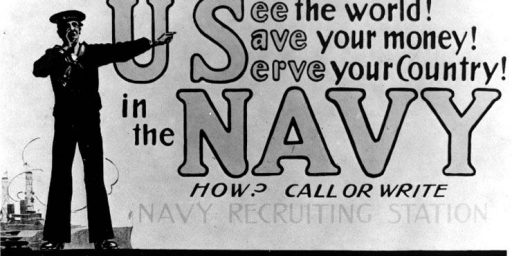Anti-Joppolos
I’m rereading a superb article by Robert Kaplan called “Supremacy by Stealth” that appeared in the July/August 2003 Atlantic Monthly. His thesis is that the future of warfare is embodied by U.S. Special Operations Command soldiers that were, at the time, conducting nearly 170 missions a year with an average of “nine quiet professionals.” The piece is especially interesting now in light of the Abu Ghraib prison scandals, as the conduct of a few loud, unprofessional soldiers has seriously undermined our mission.
A couple of excerpts demonstrate the point.
The hero of Hersey’s World War II novel is Army Major Victor Joppolo, an Italian-American civil-affairs officer appointed to govern the recently liberated Sicilian town of Adano. Joppolo is full of resourcefulness. He arranges for the U.S. Navy to show local fishermen which parts of the harbor are free of mines, so that they can use their boats to feed the town. He finds a bell from an old Navy destroyer to replace the one that the Fascists took from the local church and melted down for bullets. He countermands his own general’s order outlawing the use of horse-drawn carts, which the town needs to transport food and water. He goes to the back of a line to buy bread, to show Adano’s citizens that although he is in charge, he is their servant, not their master.
***
One good man is worth a thousand wonks. As The Times of India wrote on July 7, 1893, the mind of a sharp political agent should not be “crowded with fusty learning.” Ian Copland, a historian of the British Raj, wrote that “extroverts and sporting types, sensitive to the cultural milieu,” were always necessary to win the confidence of local rulers. In Yemen recently I observed a retired Special Forces officer cementing friendships with local sheikhs and military men by handing out foot-long bowie knives as gifts. In a world of tribes and thugs manliness still goes a long way.
The abusers at Abu Ghraib were the polar opposite of Joppolo: cowardly men (and women) with no honor who took advantge of their position of power to feel like big men.
One can debate what members of El Salvador’s military “understood,” but Roach’s team and others pounded home the point that violating human rights almost never makes sense from a pragmatic perspective, because it costs the military the civilian support so necessary to rooting out guerrilla insurgents. “Human rights wasn’t a separate one-hour block at the beginning of the day,” Roach said. “You had to find a way to couch it in the training so that it wasn’t just a moralistic approach.” Human-rights abuses didn’t come to an end in El Salvador, but observers agree that they were sharply curbed.
The world is a gritty, messy place, and there are no perfect solutions. But the fact is that Third World military men are more likely to listen to American officers who brief them about human rights as a tool of counterinsurgency than to civilians who talk about universal principles of justice.
And talking about human rights while grossly violating them, presumably, has precisely the opposite effect.
I commend the entire piece to you.




You’re right: that piece is excellent. I actually incorporated it in my Tech Central Station essay, though I focused on the fourth rule for managing an unruly world, which urged the use of the military to promote democracy.
James,
Very good article. Robert Kaplan has become one of my favorite authors: his Coming Anarchy should be required reading for anyone involved with national secuity. A month or two ago he had a article interviewing the military representative in Mongolia that is also a must read.